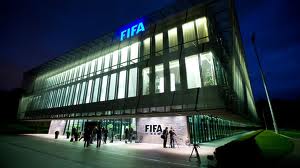By Paul Nicholson and Andrew Warshaw
November 16 – Saoud Al-Mohannadi, the Qatari official who FIFA disqualified at the last moment from standing as an Asian member of its ruling Council, has now been banned by FIFA’s ethics committee for one year for failing to cooperate as a witness with a FIFA investigation.
Al-Mohannadi, a vice-president of the Asian Football Confederation (AFC) and of the Qatari FA, was at the centre of the remarkable decision by the AFC to call off its extraordinary congress in Goa in September after just 27 minutes. At the heart of the protest was the feeling within the AFC member associations that FIFA was using its Ethics department as a political tool to secure the election of officials to the FIFA Council who were sympathetic to the views FIFA president Gianni Infantino.
Al-Mohannadi had been one of four male contenders in Goa, from whom the AFC was due to choose two for FIFA Council, the others being Chinese federation general secretary Zhang Jian (a shoo-in had the election gone ahead), Iran’s former federation president and AFC vice-president Ali Kafashian Naeni plus Singapore FA president Zainudin Nordin. The last two are understood to have voted for Infantino at the FIFA presidential election earlier this year.
FIFA Ethics investigatory and adjudicatory chambers both deny they are complicit in being used as a tool of the FIFA administration, saying that there are many on-going investigations and that it is just a result of timings. But certainly it looked like a golden opportunity taken by the FIFA administration to fill the FIFA Council with Infantino supporters. That it failed so far is a measure of how the AFC and its federations will not be whitewashed by FIFA mandarins.
The judgement against Al-Mohannadi again raises the lurking spectre of former Asian football chief Mohamed bin Hammam. The ruling mentions Al-Mohannadi’s failure to co-operate in “the proceedings against a third party”, but neither mentions who that third party is or the nature of his failure to co-operate.
Sources indicate the unnamed third party is someone already under investigation by the FIFA Ethics bodies. The day before the Al-Mohannadi ruling, FIFA’s adjudicatory chamber had announced formal proceedings against Najeeb Chirakal, a former aide to disgraced ex-Asian football chief Mohamed bin Hammam, based on the final report submitted by ethics investigators who recommended a life ban.
Chirakal was an employee of the Qatar Olympic Committee as well as being one of bin Hammam’s key aides. It is the clarification of his role that seems to be at the root of FIFA ruling against Al-Mohannadi.
However, there may be other on-going investigations of others that prevent the naming of the third party. In FIFA Ethics judge Hans-Joachim Eckert’s summary of former FIFA investigator Michael Garcia’s report into 2018 and 2022 World Cup bidders, Eckert mentioned a Qatari bid committee employee who was deemed to have broken bid rules but not to the extent of influencng the outcome of the vote, but that this person should be investigated.
It is not clear if Chirakal is that person as he did not work as an employee of the bid team.
The ban by FIFA’s adjudicatory chamber, interestingly, is less than half the two and a half-year minimum sanction recommended by ethics investigators. The ethics committee said in a statement that Al-Mohannadi had infringed two articles of the FIFA code of ethics. In addition to the one-year ban, FIFA’s Eckert fined him CHF20,000. Not an insignificant sum for an official who has just been deprived of his position.
Last month the AFC rescheduled its congress to elect candidates for the FIFA Council for February 28 at its headquarters in Kuala Lumpur but it is now clear Al-Mohannadi, who denies any wrongdoing, will not be chasing one of the available seats.
The new election date will give those chosen time to take up their positions before the FIFA Congress in May but not before the FIFA Council decides on the future size and format of the World Cup finals at its next meeting in Zurich in early January. Whether the three remaining candidates from the aborted Goa summit will again run has not yet been made clear though there is speculation that another Qatari, 2022 World Cup chief organiser Hassan al-Thawadi, might put his name forward having lost out in 2013 in his bid to join the old executive committee which has now been rebranded, expanded and renamed. A source close to the Qatari politics said that he is unlikely to stand.
Meanwhile the embattled Qataris who every time they put their heads above the parapet seem to get shot at for the alleged sins of their countrymen’s past, will await the ruling on Chirakal.
Chirakal is alleged to have breached seven parts of the ethics code, with the investigation having focused mainly “on his involvement in payments to several football officials.”
Charges include bribery and corruption, offering gifts, conflicts of interest and failing to co-operate with investigators.
Chirakal has previously been identified as allegedly the middleman for African and Asian officials seeking cash payments from Bin Hammam.
Somewhere in this is the presumption of innocence until proved guilty though many in Qatar will be wondering if when it comes to them it is a case of guilty until they are properly hung out to dry for the alleged sins of the past.
No smoking gun has ever been found to prove Qatari 2022 bid guilt, but the treasure hunt seems still to be very much on.
Contact the writers of this story at moc.l1751420874labto1751420874ofdlr1751420874owedi1751420874sni@n1751420874osloh1751420874cin.l1751420874uap1751420874 or moc.l1751420874labto1751420874ofdlr1751420874owedi1751420874sni@w1751420874ahsra1751420874w.wer1751420874dna1751420874
